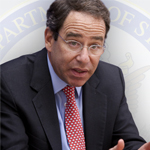
Thomas Nides is the Deputy Secretary of State.
First posted at DipNote
Last week, I had the opportunity to sit down and talk with some bloggers in an on-line event co-hosted by our friends at the U.S. Global Leadership Coalition (USGLC). We discussed the challenges we at the State Department face in the current budget environment, as well as the work we’re doing to keep our nation secure and our economy strong. It was a great opportunity for me to share my thoughts on these important issues and, more importantly, to hear from the foreign policy community.
One of the most critical questions — and one I hear often — focused on how the State Department and the U.S. Agency for International Development (USAID) will deal with the challenging budget environment. The short answer is that serious cuts to development and diplomacy — to America’s investment in global leadership — would seriously undermine our long-term national security and economic prosperity. Of course, we know some cuts are coming and we’re preparing to do more with less. But in these troubling times, America simply cannot afford to retreat from the world. To learn more about what we’re doing, click here.
I also was asked again about the Arab Awakening, and how our diplomatic and development tools are being used to help countries like Egypt and Libya take steps toward democracy. I wrote about that in detail just this week, and you can find it here.
During the online event, I had the chance to answer many other thoughtful questions on important issues from the President’s Feed the Future Initiative to PEPFAR to our work in Iraq. But unfortunately, I didn’t have a chance to get to all of the questions that were asked, so I wanted to address two of them in this blog entry.
First, Barbora Nemcova from MCHIP, USA asked: “Can we afford to cut back funding for foreign aid programs that are working? Can we risk losing all the results we’ve achieved so far?”
It’s an excellent question, and I appreciate Barbara’s pointing out that there are significant costs to inaction. Some of the advances we’ve made in the past decades have had significant impact on our efforts around the world, and have paid off for those we assist and for the American taxpayer. For instance, our work in establishing FEWS NET, the famine early warning system, allowed us to see early on the deteriorating conditions in the Horn of Africa and take steps to mitigate the humanitarian crisis. We prepositioned food — saving expensive shipping costs — and invested in teaching farming techniques. All of this costs less and helps more people. The same is true of any number of the innovative assistance programs and techniques that our development experts and diplomats are pursuing in the field. Cutting these programs now will force us to reinvent the (more expensive) wheel in the future. That’s bad for America and the rest of the world.
Also, let’s look at South Korea. Decades ago, the State Department and USAID invested heavily in Korea to help rebuild its devastated economy after the Korean War. This week, Congress approved a free trade agreement with the Republic of Korea — our biggest trade deal in nearly two decades — to boost American exports to the Korean market and to create American jobs. Not every country we’re assisting now will be the next Korea, but a few of them will. And if we’re not there, if we’re not building these long-term, people-to-people relationships, then we’ll miss out on the huge gains in the future. There’s no doubt about that.
Second, Rolf Rosenkranz of DevEx asked: “There’s a lot of talk about the ‘three Ds’ – development, diplomacy and defense. Is USAID turning into just another national security arm of the federal government?”
Rolf, USAID has always been critical to our national security and our economic future. Fifty years ago, President Kennedy recognized the value of sharing the best of America with the rest of the world. Innovative farming and market techniques and life-saving vaccinations have saved millions of lives, stabilizing the world and helping America’s national security.
But USAID is far from “just another” national security arm. Serving side-by-side with non-governmental organizations (NGOs) and the development agencies of other nations, USAID has a unique role that has paid tremendous dividends. USAID fights hunger, responds to humanitarian disasters, treats diseases, and strengthens indigenous food production because it’s the right thing to do and because it’s the most cost-effective way to advance American interests. As I often say, our moral compass and self-interest are perfectly aligned.
I’m always interested in talking with more of you about these issues. If you have any questions, respond here, and we’ll make sure you get the answers you need. Thank you for your time and caring so much about the future of U.S. leadership around the globe!
